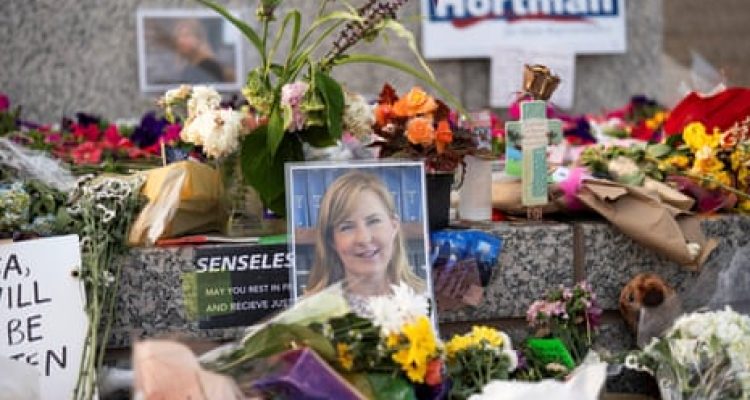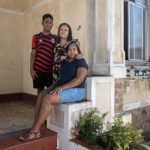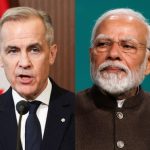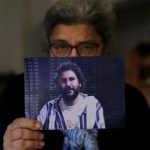As Alaa Abd el-Fattah’s mother remains on hunger strike, supporters say activist’s continued detention is campaign of vengeance by Egypt’s president
Family, friends and supporters of the jailed British-Egyptian activist Alaa Abd el-Fattah have spoken about the conditions of his long imprisonment as his mother,Laila Soueif, remains in a London hospital in declining health on a hunger strike to secure his release.
Amid a mounting campaign to put pressure on British ministers to intervene more forcefully on Abd el-Fattah’s behalf, supporters say his continued detention is part of a campaign of vengeance motivated by the personal animus of the Egyptian president,Abdel Fatah al-Sisi, towards him.
The activist, who came to prominence during Egypt’s 2011 Tahrir Square protests, has been jailed twice, the second time months after his release from prison in 2019, and continues to be imprisoned despite completing his five-year sentence last autumn.
Abd el-Fattah’s first period in prison – from 2015 to 2019 – and part of his second was spent in the Tora maximum-security prison, a place designed to hold violent jihadists, but since 2022 he has been held in Wadi al-Natrun in Beheira province in the Nile delta.
With the harshest conditions in Tora – where Abd el-Fattah was beaten – his regime was also designed deliberately to isolate and demoralise him, say supporters, depriving him for three years of books and limiting his contact with other prisoners.
Between September 2019 to May 2022 he was held in a small, poorly ventilated cell, denied a bed and mattress as well as reading materials and exercise. “The idea was to crush his spirit,” says Mona Seif, his sister, who has visited her brother in jail. “I think after so many trials and attempts to break him, the regime has realised that the way crush to him is to isolate him from the world and render him mute. That’s been the tactic since his second period in jail beginning in 2019.”
What has become clear to Seif, and others campaigning to release him, is that the treatment of her brother is being driven by a very personal animosity directed at Abd el-Fattah and his family by Egypt’s president.
“It seems very personal,” says Seif. “Since 2019 the unofficial messages we have been getting from different Egyptian institutions is that our file is with Sisi.”
Abd el-Fattah was a familiar and always approachable figure in Tahrir Square during the 2011 mass protests that led to the fall of the government of Hosni Mubarak. Articulate, passionate and thoughtful, his great skill was seen in bringing different groups together.
Sentenced to jail for organising a political protest without permission in 2015, Abd el-Fattah was briefly released in March 2019 but was rearrested months later and charged with spreading “fake news undermining national security” for a retweet.
One person with a personal insight into what Abd el-Fattah has been through is the activist and poet Ahmed Douma, who was imprisoned during his first spell in jail in Tora, where for 10 months the two men were in separate, solitary cells facing each other, until the authorities decided their proximity was a problem.
Unlike Abd el-Fattah, Douma was pardoned and released by Sisi in 2023. January 2011 – when 18 days of mass protests led to the resignation of the then president, Hosni Mubarak – “was, still is, and will forever remain a personal enemy to Sisi. And Alaa was one of the symbols of that period,” Douma told the Guardian.
“At the same time, he’s an activist who has audience and influence – a thinker with his own philosophy and interest in how political movements develop, how people move, how they understand things.
“And of course, he also became a symbol of the stupidity of the authorities.
“The truth is that even one hour in prison inevitably leaves an impact, and it’s not trivial,” adds Douma, who spent more than 10 years in prison. “There’s depression from what happened in prison, whether things that happened to you directly or which you witnessed. Torture, assault and so on.
“It’s not just the impact on the body, but on the mind. At some point, you realise that you’ve been in solitary confinement for days, months, days or years, with no communication. I haven’t even begun the journey of recovery from the effects of those 10 years.”
Aida Seif El-Dawla, a psychiatrist, human rights defender and co-founder of El Nadeem Center for the Rehabilitation of Victims of Violence, says: “Look, in Egypt, detention is a psychological torture. I don’t know what those people are punished for except that they expressed an opinion. And to put people in prison because they expressed an opinion, that’s not a legal punishment. But apparently, Abdel Fatah al-Sisi thinks otherwise.
“This is the punishment of the saddest father who tortures his children for non-obedience.”
What is clear is that the Egyptian authorities regard Abd el-Fattah’s detention as open ended, holding him beyond his originally scheduled release date and also holding another potential prosecution over him.
Our morning email breaks down the key stories of the day, telling you what’s happening and why it matters
Mahmoud Shalaby, a researcher at Amnesty International who deals with Egypt, says: “The whole thing is about making an example of him. He’s already been brutally punished. He has spent almost 10 years in prison solely for practising his human rights. Alaa’s case is extremely extraordinary, especially as Egypt has a history of releasing dual nationals who are arbitrarily detained.
“I think the fear is that if he was released, he would go abroad and criticise the government from there. But that’s not a reason to keep him arbitrarily in prison.”
His lawyer, Khaled Ali, says: “Alaa should have been released on 28 September last year.” Instead, the courts have declined to include his period of pretrial detention, prior to ratification of the sentence, meaning he will not be released until 2027 – if then.
Ali says: “He was sentenced to five years in prison and he has been detained since 28 September 2019. His sentence should have ended on 28 September 2024.”
After a hunger strike in 2022, Abd el-Fattah has been allowed access to books and now a television in Wadi al-Natrun, from where he is able to write and receive letters from his family.
“Alaa and my mum are both big science fiction fans and so he reads a massive amount,” says Seif. “Science fiction, graphic novels and anything to do with science. Now he is allowed a television, he follows tournaments. He’ll treat a tournament as a whole project. If Wimbledon is on, he will follow for the day.
“But because of the way the prison was constructed, the exercise area is a big hole with concrete walls and no ceiling. He hasn’t walked in sun for over five years.”
The family are able to monitor his mood via his response to the cats that have sought shelter in the prison and whom he has adopted. “If his mood is good he shares lots of pictures of the cats.” His mood in recent months as his release date has come and gone has not been good.
Attempts by successive British governments and EU officials – among others – to intervene behind the scenes have been a failure as Egypt has faced no consequences for its human rights abuses. Lacking interlocutors with influence within Sisi’s immediate circle, Abd el-Fattah’s case is stuck, even as his mother’s health inLondonhas dangerously worsened.
One person who has been involved in advocacy for Abd el-Fattah says: “The policy of private engagement has been going on for over 10 years. You only see movement on human rights issues in Egypt where there is the threat of action.”
Seif says: “They just want his absolute surrender and Alaa completely broken and mimicking the regime’s narrative. Even the slightest indication of independence they see as defiance. The whole thing is a senseless act of pure vengeance that leaves us to keep guessing, what is it for, and when will be enough.”
Ahmed Douma adds: “If I could send him a message and tell him anything, I would tell him that we are with him. And that his freedom and Laila’s life are our personal battle.”
















